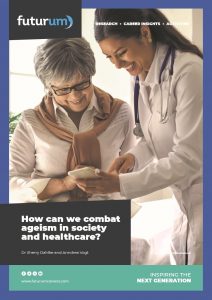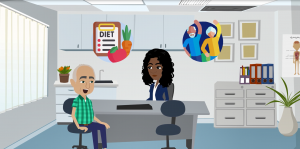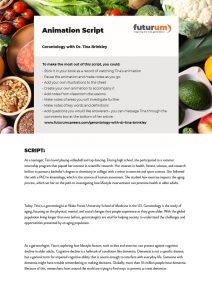Can lifestyle choices protect your brain as you age?
As we grow older, maintaining cognitive health becomes increasingly important. Dr Tina Brinkley, a gerontologist at Wake Forest University School of Medicine in the US, is researching how our everyday choices – like what we eat, how we move, and how we connect with others – can protect our brains from cognitive decline. Her work explores the links between lifestyle and brain health in older adults, offering hope for preventing diseases like Alzheimer’s.
Talk like a gerontologist
Alzheimer’s disease — a specific type of dementia that slowly worsens over time, causing memory problems and making it difficult to think clearly
Cognition — the mental processes involved in gaining knowledge and understanding, including thinking, knowing, remembering, judging, and problem-solving
Cognitive decline — a reduction in cognitive abilities, including memory loss and decreased thinking skills, often associated with ageing
Dementia — a general term for a decline in mental ability severe enough to interfere with daily life
Multidomain lifestyle intervention — a programme designed to target multiple lifestyle factors to improve overall well-being
Vascular — relating to blood vessels
As we age, many of us worry about the possibility of losing our mental sharpness. Cognitive impairment, which can range from mild memory loss to severe dementia, occurs when brain cells are damaged and can no longer communicate with each other effectively. While some risk factors for cognitive decline, like age and family history, are beyond our control, others can be modified through lifestyle changes.
Dr Tina Brinkley, a gerontologist at Wake Forest University School of Medicine, is exploring how lifestyle factors, such as diet and physical activity, help to protect the blood vessels that supply the brain with oxygen and other nutrients. Healthy blood vessels can protect against cognitive decline in older adults. By identifying modifiable risk factors, her work aims to develop effective strategies to maintain brain health and prevent conditions like Alzheimer’s disease from taking hold.
Can lifestyle really make a difference?
In 2015, the Finnish Geriatric Intervention Study to Prevent Cognitive Impairment and Disability (FINGER) was the first major trial to show that lifestyle changes targeting multiple risk factors – such as diet, exercise, and social activity – not only prevent cognitive decline but also improve overall health and reduce the risk of dementia. “According to the World Health Organization (WHO), more than 55 million people worldwide have dementia, with nearly 10 million new cases diagnosed every year,” says Tina. “Given that modifiable risk factors account for ~40% of dementia cases, replicating FINGER in countries around the world could have a substantial public health impact.”
The FINGER study highlighted how simple actions, such as maintaining a balanced diet and staying physically active, had profound positive impacts on brain health in older Finnish adults. Building on this success, a similar project called the US POINTER trial is now testing whether such lifestyle interventions have similar effects in different populations. By focusing on culturally adaptable strategies, the trial aims to determine if people from diverse backgrounds can benefit from these interventions. The hope is that this research will empower people to take control of their brain health, demonstrating that even small changes in lifestyle can lead to significant improvements in brain function and overall well-being.
What is the US POINTER trial?
The US POINTER trial is studying over 2,000 participants across the US for two years. “The trial is comparing two multidomain lifestyle interventions that target multiple risk factors (including exercise, diet, and social stimulation), but which differ in format and intensity,” explains Tina, who leads a POINTER substudy focused on vascular health. Half of the participants are following a ‘structured intervention’, which includes an intensive programme of exercise, nutritional counselling, cognitive training, and social activities. These participants receive regular support and monitoring to help them stay on track. The other participants are following a ‘self-guided intervention’, which is less intensive but still encourages healthy behaviours. Self-guided participants meet in groups a few times a year to receive education and support, and their progress is monitored through check-ins. “This comparison will allow US POINTER investigators to better understand the types and amount of resources needed to deliver an effective lifestyle intervention in older adults at risk of dementia,” says Tina.
How is cognitive health measured?
To evaluate the effectiveness of these interventions, the US POINTER trial collects a wide range of data from participants before, during, and after they complete their assigned intervention. Cognitive health is the primary outcome of interest. “Cognition is evaluated using a set of tests that measure memory, executive function, and processing speed,” explains Tina.
“Additional information is obtained from questionnaires and clinical measurements that evaluate the participant’s mood, quality of life, dietary intake, activity, medical history, blood glucose and cholesterol levels, and blood pressure,” adds Tina. “Data from self-reported logs and wearable devices (e.g., Fitbits) are also collected to track how well participants are following their assigned intervention.” Some participants undergo additional tests to examine their brain structure and function, sleep quality, vascular health and gut health.
“Collectively, this information will be used by US POINTER investigators to determine whether the interventions are effective at improving cognition and overall brain heath, and if so, what factors are contributing to these improvements.”
How will this study benefit individuals and public health?
“To date, approximately 65% of the 2,111 participants enrolled in the US POINTER trial have completed the two-year study,” says Tina. “The remaining participants are actively engaged in the ongoing interventions and will finish in May 2025.” The final results of the trial are expected to be released as early as summer 2025.
Once participants complete the two-year intervention, they will have the option to enrol in a four-year observational study to monitor the long-term effects of the interventions. This extended study will provide valuable insights into how lifestyle changes can impact cognitive health over time and could help shape future public health policies.
“I hope that people will better understand the important role that lifestyle plays in promoting overall cognitive and physical health during ageing,” says Tina. “FINGER, US POINTER, and similar clinical trials will be critical in answering important questions about the impact of lifestyle interventions on brain health.” The data from such studies could pave the way for new programmes and policies aimed at preventing dementia and improving the quality of life for older adults.
Health disparities present another significant challenge in gerontology. “In general, life expectancy has increased over the past several decades due to advances in medicine and technology, economic growth and development, and public health efforts,” says Tina. “However, older adults from racial and ethnic minority groups and those from disadvantaged backgrounds have a disproportionately lower life expectancy, which reflects the higher prevalence of chronic conditions in these populations, as well as the negative impacts of adverse socioeconomic, environmental and healthcare factors.” Moreover, these groups are frequently underrepresented in gerontological research, which can lead to gaps in knowledge and ineffective treatment strategies.
 Dr Tina Brinkley
Dr Tina Brinkley
Department of Internal Medicine, Section of Gerontology and Geriatric Medicine, Wake Forest University School of Medicine, USA
Field of research: Gerontology
Research project: Investigating the impact of lifestyle interventions to protect cognitive function and brain health in ageing populations
Funders: US National Institutes of Health (NIH), National Institute on Aging (NIA), Alzheimer’s Association
About gerontology
Gerontology is the study of ageing, focusing on the physical, mental, and social changes that people experience as they grow older. With the global population living longer than ever before, gerontology is becoming increasingly important. “According to the US Census Bureau, by 2060 the number of individuals aged 65 and older is predicted to nearly double,” says Tina. This significant demographic shift presents both challenges and opportunities for society.
Addressing health disparities in ageing
One of the major challenges facing future gerontologists is addressing the social, economic and healthcare implications of an ageing population. As more people enter their senior years, the demand for healthcare services, social support and policies that address the needs of older adults will increase. Additionally, the ageing population is becoming more diverse, which means there will be a growing need for professionals who understand the unique cultural and social factors that impact ageing in different communities. “This is particularly important given the well-known differences in health outcomes across different segments of the population, including older adults, racial and ethnic minorities, and women,” says Tina. “Researchers, healthcare providers, community organizations, policymakers, patients and caregivers will need to work together to find innovative ways to identify and address health disparities in ageing.”
Pathway from school to gerontology
“Gerontology is broad and touches on biological, physical, psychosocial, and other changes that occur across a person’s lifespan,” says Tina. “It is a very interdisciplinary field and can be studied within the context of multiple disciplines.”
“Some colleges and universities offer specific degree programmes in gerontology or ageing studies,” says Tina. You can also get a degree in a different field, such as biology, psychology, social work, or medicine, and apply it to gerontology work.
“Any subject, whether it is in STEM (Science, Technology, Engineering, and Maths) or SHAPE (Social sciences, Humanities and the Arts for People and the Economy), can incorporate an ageing-related perspective to encourage you to think about how different topics may be relevant to individuals across different age groups,” explains Tina.
Explore careers in gerontology
Gerontological organisations, such as the Gerontological Society of America (www.geron.org), the American Society on Aging (www.asaging.org), and the American Aging Association (www.americanagingassociation.org), provide information about education, research, training and careers in gerontology and ageing-related fields.
Wake Forest University School of Medicine offers the Enhancing Undergraduate Education and Research in Aging to Eliminate Health Disparities (ENGAGED) programme, in which students from underrepresented backgrounds are encouraged to pursue careers in ageing research. By increasing diversity in the field, future generations of gerontologists will be prepared to tackle the complex challenges of a diverse ageing population. Similar programmes can be found at institutions across the US: www.nia.nih.gov/research/training/nia-supported-advancing-diversity-aging-research-through-undergraduate-education
Meet Tina
I was a very creative teenager and had an active imagination. I loved reading, drawing and writing (mostly poems and stories). I also enjoyed playing volleyball, listening to music, and tap dancing.
While I was in high school, I participated in a summer internship with the Environmental Protection Agency. This introduced me to research, which I really enjoyed, so I took part in other research projects during my time in college. These experiences taught me about the stages of conducting a research study and gave me a glimpse into life as a biomedical researcher, which I found intriguing.
My interest in health and fitness led me to pursue a degree in exercise and sport science. I realised I could combine these interests with my interests in science and research by pursuing a PhD in kinesiology (the science of human movement). My graduate programme was focused on exercise physiology and ageing, and that set me on the path to studying how lifestyle interventions impact the ageing process and promote health in older adults.
I’ve always been interested in understanding the impact of diet and exercise on health outcomes. When I started doing my own research, I focused mostly on how these lifestyle factors affect cardiovascular and metabolic health. Then, about 10 years ago, a colleague encouraged me to think about how my research might be relevant to Alzheimer’s disease. At that time, there were relatively few studies focused on multidomain lifestyle interventions to prevent dementia. This presented an exciting opportunity for me to conduct novel research to help fill these important gaps in knowledge.
My proudest career achievement came when I was awarded three major NIH grants, totalling over $15 million, within a span of nine months. This led to me becoming one of the highest funded faculty investigators in my department. This achievement is a testament to the value of hard work and perseverance, which I could not have accomplished without the unwavering support of my family, mentors, and colleagues.
When I’m not working, I enjoy spending time with family, travelling, watching movies and making memories that I capture in scrapbooks.
Tina’s top tips
1. Find your passion and interests then seek opportunities to explore different career options that align with these interests.
2. Take advantage of as many opportunities as possible.
3. Be open to new experiences.
4. Find good mentors who are supportive and can provide constructive feedback and career guidance.
Do you have a question for Tina?
Write it in the comments box below and Tina will get back to you. (Remember, researchers are very busy people, so you may have to wait a few days.)
Reference
https://doi.org/10.33424/FUTURUM549
Download the Spanish PowerPoint
This educational material has been produced by Wake Forest University School of Medicine in partnership with Futurum and with grant support from The Duke Endowment. The Duke Endowment is a private foundation that strengthens communities in North Carolina and South Carolina by nurturing children, promoting health, educating minds and enriching spirits.
Let us know what you think of this educational and career resource. To provide input, simply scan the QR code or click here.

Discover how gerontologists are combating ageism in healthcare and society:
www.futurumcareers.com/how-can-we-combat-ageism-in-society-and-healthcare























0 Comments